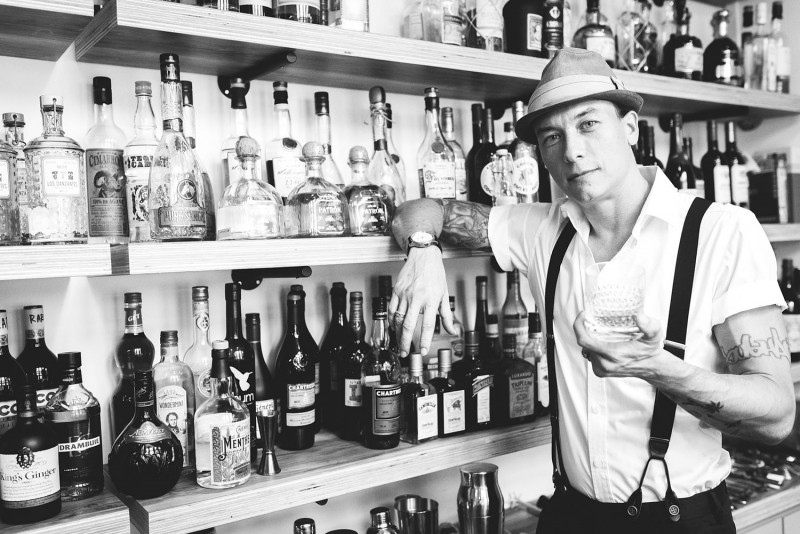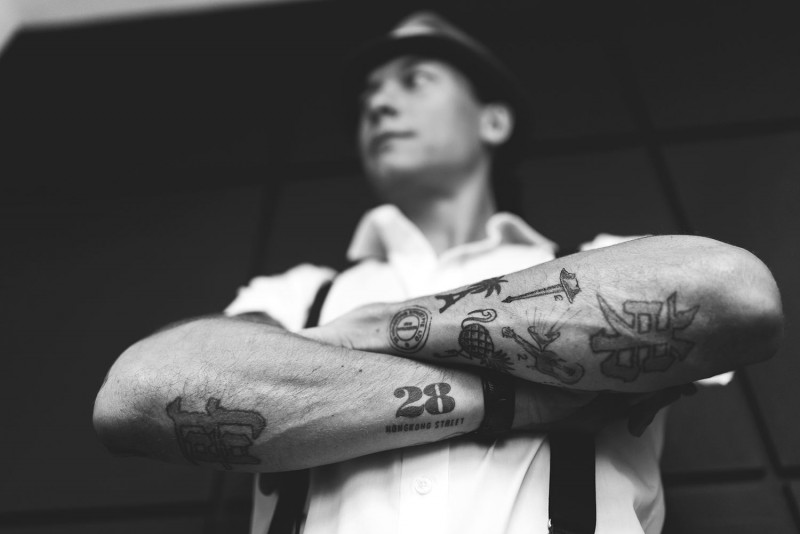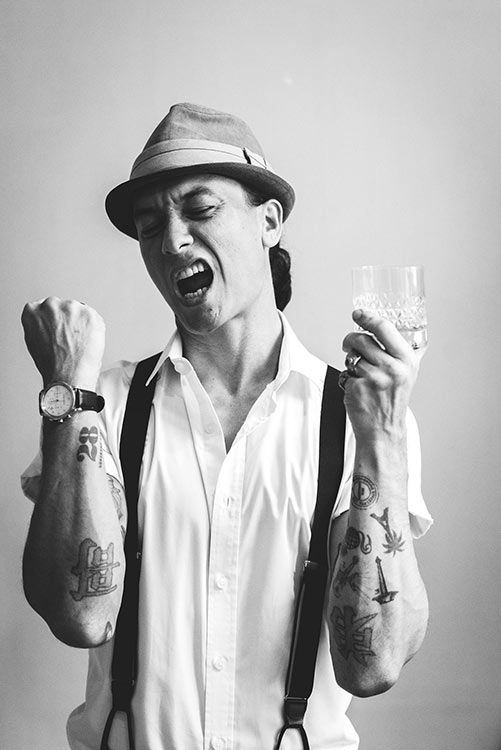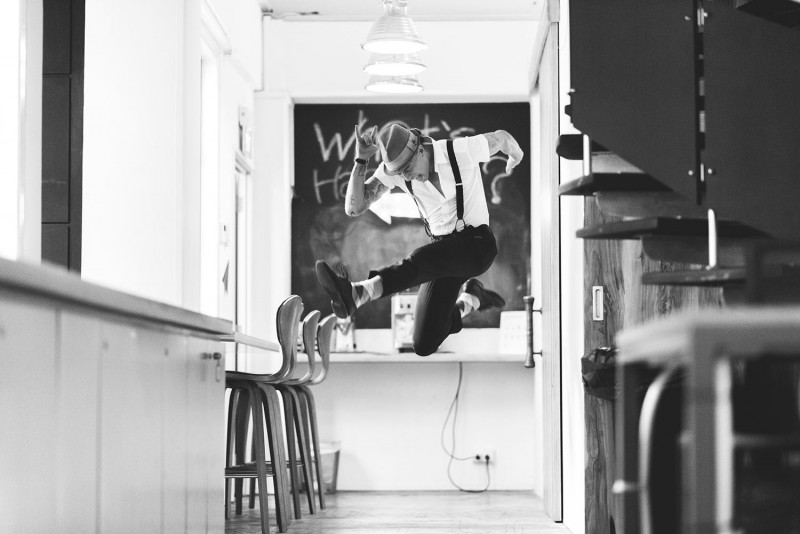Michael Callahan: Breaking Barriers and Redefining Stereotypes
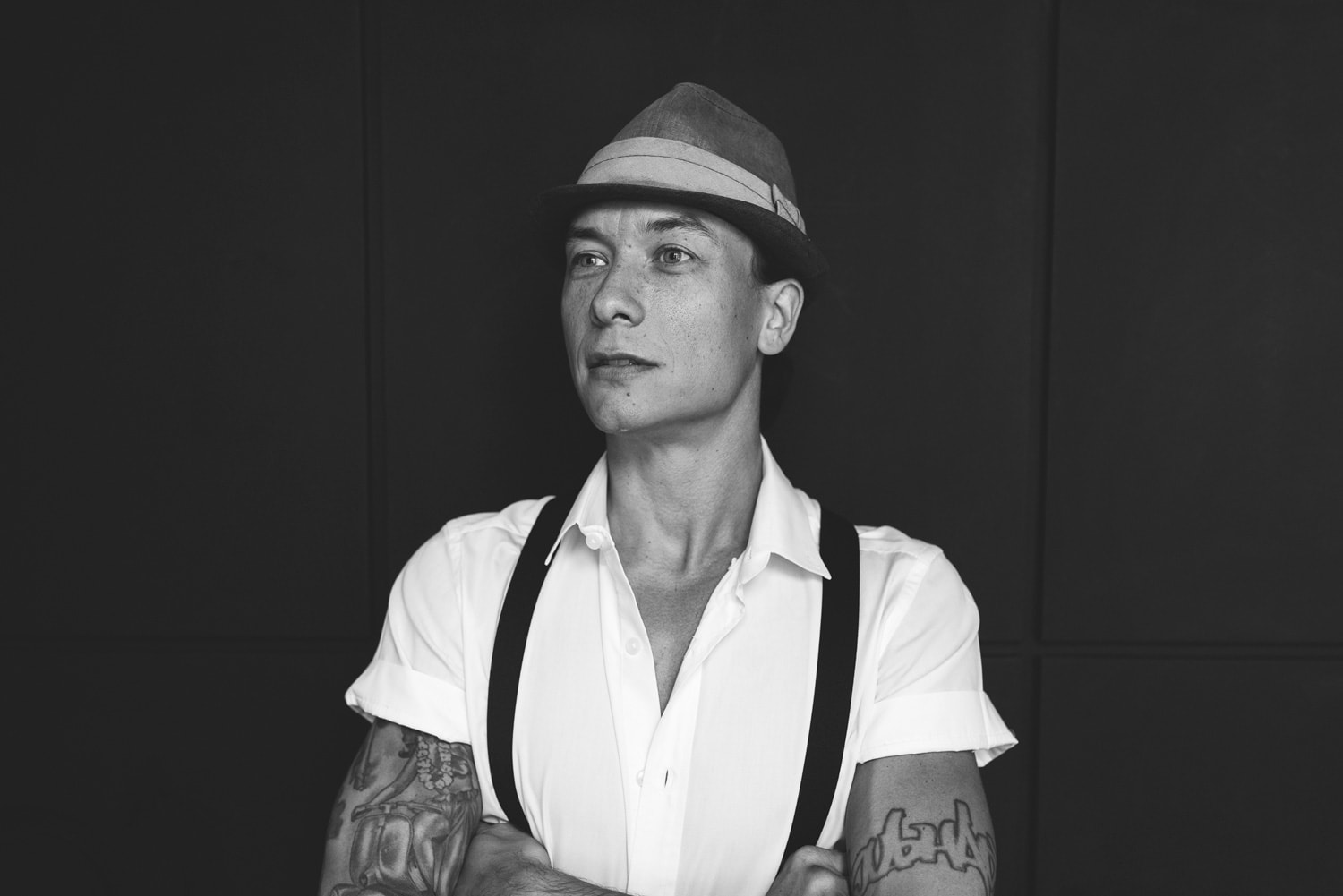
Three years ago, Michael Callahan found himself in a tricky situation – he was standing in the hallway at 4am in the morning, completely naked at one of London’s poshest hotels, The Baglioni. His rather inebriated state and lack of contact lenses caused him to lock himself out of his own room. He sobered up very quickly after realising the gravity of his folly. There were only two options available: he could either go to his colleague, Desiree’s room, or bite the bullet and go down to the lobby for assistance.
He opted for the latter. “I whispered to the bellboy about my predicament, and he asked if I had any ID. Where on earth would I keep it? Anyway, I held the elevator door for him, but he said he would meet me outside my room. I guessed he did not want to be in a confined space with a naked guy with tattoos.” Naturally, anyone would be embarrassed, but Michael’s slight nonchalance and amusement towards the entire affair is refreshing. His voice deepens. “It was definitely one of the most memorable and awkward moments of my life. The next day, I suited up for an awards ceremony and the bellboy couldn’t recognise me. He said that I looked so different. . . with clothes on.”
Since its opening in 2011, 28 HongKong Street (28HKS) has elevated Singapore’s cocktail scene by racking up a slew of international awards. And this year, they came in 7th on the list of World’s 50 Best Bars. As the founding bartender, Michael has played a pivotal role in the bar’s success, even making a name for himself along the way. Yet, he breaks out into a sentimental tone. “28HKS was a project of passion. Together with my partners, we literally built the place with our own hands – there was a lot of blood, sweat and tears that went into it. We even spray-painted the air conditioners black.”
By any standard, Michael’s career is going gangbusters. But there’s much more to that. He wants to redefine stereotypes by showing how bartending can be a viable trade. “You can have a proper career by learning how to brand yourself. People respect chefs, but they still don’t necessarily respect bartenders.”
There is something adjective-defyingly captivating about Michael. Aside from his trademark hat, slicked man bun and 10 per cent body fat, he is a magnificent talker and often plays matchmaker at the bar, quite adroitly. As I dig deeper, he sings praises about his Yorkshire Terrier, before elaborating on the perks of being a bartender. “The best part is you learn so much about people and their culture. . . and even life in general.”
His giving spirit and unselfish desire to educate, inspire and help others in the cocktail community is admirable. “The greatest legacy you will ever leave behind is inspiring people to carry on what you love doing,” he says.
WY-LENE YAP: How was it like growing up in Hawaii?
MICHAEL CALLAHAN: I’m Hapa (mixed), and Hawaii was a hard but beautiful place. In the neighbourhoods I grew up in, if you have a lighter complexion, then you’re a minority. So as a minority, I was picked on, but I learnt a lot about racism and the dynamics of my environment. There is an unfortunate dark side that exists in many tourist-driven places – the side they want you to see versus the reality. When I was growing up, the economy was very, very weak and there was a lot of disparity. People often lived together for many generations because no one could afford to buy an apartment or a house. A week ago, I was in Hawaii and a good friend of mine said, “It’s not cheap to live in paradise.” And she meant that emotionally, financially, physically… it’s trying but it’s so rewarding at the same time.
WY-LENE: What is your ethnic heritage?
MICHAEL: My mum is Swedish-Filipino and my dad is Irish-American.
WY-LENE: I heard you’re based in Hong Kong right now.
MICHAEL: Yes. Proof & Company is 28HKS’s sister company, and they expanded to Hong Kong about a year and a half ago. As a distributor, Proof & Company has been very important at the back end in terms of driving the cocktail scene. When 28HKS became successful, people were wondering if we were going to open another bar. But instead of competing with other players, the best thing would be to encourage and empower the cocktail community. There is an aphorism that says, “A rising tide lifts all boats.” So by giving the community access to award-winning spirits which have made 28HKS special, it has helped everyone flourish – bartenders can now really express themselves by using a variety of alcohol types. As much as I love being in Singapore to reap the rewards, I’m more of a ship builder than a captain. And since the Hong Kong cocktail community wanted an internationally recognised and popular cocktail scene like Singapore, I decided to help guide them. I do a lot of consulting and provide support to the bartenders too. This new role has taught me about import and export, securing projects with clients, and how to become a businessman.
At the beginning, it was 80 per cent BS (bullshit) and 20 per cent knowledge. Now, it’s 80 per cent knowledge and less BS.
WY-LENE: How did you learn to bartend?
MICHAEL: It was accidental. In the late '90s, I was in New York City…
WY-LENE: And you were working as a barista…
MICHAEL: Right, so a lovely lady who was a daily customer thought that I was very good at hospitality. I was always energetic, charismatic and bubbly. Somehow, she offered me an opportunity and threw me behind the bar. It was sink or swim – I had no talent, no skills, no knowledge whatsoever, but I was comfortable talking to people. And in this trade, that’s actually one of the aspects people have difficulty with. Naturally, I am a chatterbox. At the beginning, it was 80 per cent BS (bullshit) and 20 per cent knowledge. Now, it’s 80 per cent knowledge and less BS.
WY-LENE: Did you go to bartending school?
MICHAEL: You can! But the best way to do it is to travel around the world, learn from mentors and get internships. And that’s what I did. Bartending is one of those trades that has a bohemian lifestyle.
WY-LENE: So you worked your way up.
MICHAEL: It’s kind of like working in a kitchen. You have two options. You can either go to formal school or start as a dishwasher and move your way up. If you go to school first, you would still have to start at an entry-level position because you don’t have any real-world experience – you have all the book smarts but no street smarts. On the flip side, if you gain working experience first, you would still need to take classes in culinary school to learn a new technique or work for a different chef. There are different ways to climb a mountain, and I chose the latter. Thankfully, it’s a lot easier for kids these days to get a job at 28HKS or Jigger & Pony, and learn from a truly great bartender.
WY-LENE: It’s never too late to become one.
MICHAEL: Yeah! But it will take a long time before you’re competent enough to run your own programme.
WY-LENE: How long will that take?
MICHAEL: It depends. People mature professionally at different rates. I see a lot of young bartenders now who are able to do a great job at running programmes. Many people who are coming out of school with business degrees are becoming bartenders, and they are applying their business knowledge to the profession. This new wave has been happening in the last 5 to 10 years. Back in the day, oftentimes if you did not know what you wanted to do in life, you were a bartender. I remember distinctly the time when parents used to say, “Oh God, my son is a bartender. When are you going to school? Why don’t you be a nurse or something?” Now, with the younger generation, parents are more open to their children being a celebrity chef or bartender. The perception of the job has definitely changed over the years.
WY-LENE: How many years of experience do you have?
MICHAEL: I started in 1999, and I haven’t stopped since.
WY-LENE: Do you prefer being called a “bartender” or a “mixologist? The term “mixologist” sounds gimmicky.
MICHAEL: The term “mixologist” used to be very popular, and then there was a huge backlash because people thought it sounded so silly. It went too far at one point – there was “spirit whisperer”, “bar architect”, all sorts of fun names. And even though the old guards would always see themselves as bartenders, I think “mixologist” is an important term especially in the last 10 years due to the rise of the craft cocktail community. It has allowed the general public to understand the difference between an average bartender at a sports bar versus someone who has truly made it his or her career path. Why are you paying more for a cocktail? Why is it harder to get a seat at a particular bar? In addition, newspapers do not want to write about a bartender, but they would love to write about a mixologist. At the end of the day, most of us see ourselves as bartenders or hospitality agents. I say this all the time: people go to bars not necessarily just for drinks. You can learn to make a great drink by going on the internet or reading the PDT Cocktail Book. When 28HKS first opened, I used to give away cocktail recipes and I would even write them down for customers. Many were perplexed. People don’t come to my bar specifically for a drink, but for the ambience too.
WY-LENE: Yeah, plus the experience and showmanship.
MICHAEL: Yeah, all of that. Quite frankly, life is difficult. You don’t always have money to spend at a bar (especially cocktail bars), because sometimes it can be pricey. Maybe at the end of the month, you’re a little short on funds but you really want that drink, so I want you to have that drink by giving you the recipe. When you’re back on your feet and have extra money in your pocket, you’re going to come back because of the love received. Many of our guests and members of the community are appreciative of that gesture to an extent whereby they become so loyal to us.
WY-LENE: What made you come to Singapore?
MICHAEL: I came to Singapore because of 28HKS. I was at a programme in San Francisco, and my contact was ending. The gentleman, who I was working for, was selling the property and I had to look for other options. A friend of mine read on a website that a few people were looking to do something in Singapore, so I wrote a very simple email to them. They replied, and one of the guys just happened to have a layover in San Francisco – we met up for a drink and really hit it off. Thereafter, they gave me 24 hours to decide if I wanted to start something fun in Singapore, and I said: let’s do it. At that time, I did not know anything about Singapore. All my friends in the industry told me not to go, as I was doing very well in San Francisco. Even my friends who did some light consulting for hotels said, “They will never do cocktails in Singapore. All they want is bottled service and Tiger beer.” I did more research and found out that Singapore had a very diverse community. The economy was strong, people were well travelled and a lot of celebrity restaurants were opening. I saw a strong food movement happening too – where there is “F”, there will be “B” – and it’s F&B after all. There were plenty of food choices available, but not a lot of bars that stood out internationally other than Tippling Club during that time. So I saw a lot of opportunities, not a lot of competition, and fairly steep barriers of entry. And if we could break those barriers of entry, we would gain a stronghold in the market. In 2011, when I arrived in Singapore, I was pleased to discover that there was actually a small cocktail community with the likes of Jeff Ho and Ethan Leslie Leong.
WY-LENE: Did you play a part in developing the concept for 28HKS?
MICHAEL: The 28HKS brand was developed over many meetings involving coffee. And it’s tightly controlled – we love who she is, we know who she is, and there is no reason to change her. She’s a darling to us. I look at her like a daughter who has grown up.
WY-LENE: It’s interesting how you used a feminine pronoun.
MICHAEL: Well, I have two little girls… so as a father figure, it’s like raising a child and I am there to support her every step of the way. All my staff still call me ‘Boss Man’.
WY-LENE: How often are you at 28HKS?
MICHAEL: I’m there at least once a month. Many of the long-time staff have matured professionally and now they run the bar so well. They have been mentored by me, Joe [Alessandroni], Zdenek [Kastenek], Jason [Williams] and even guest bartenders. Customers love it when I get behind the bar, but my staff would shoo me away and say, “You’re too slow these days. Go and talk to the guests. They love you.”
WY-LENE: Have you always wanted to own a bar?
MICHAEL: Yeah. Eventually, down the line, I would like to have a simple bar that opens whenever I want to. I told my dad he should become a barman when he retires because it will help to keep him active and stay connected to the community – so long as he can keep the vice under control; that’s the big issue.
WY-LENE: 28HKS reminds me of Apotheke in Chinatown, New York – a wonderful bar behind an unassuming door. Apart from being a discreet speakeasy, how does 28HKS differentiate itself from the rest of the bars in Singapore?
MICHAEL: I haven’t been to New York in a while. But I will be going back early next year since I promised Steve [Schneider] and Igor [Hadzismajlovic] I would finally do a shift at Employees Only (EO). They have been telling me I need to get an EO tattoo for a couple of years already. And I can’t, unless I do a shift first. I haven’t heard of Apotheke, but I will definitely check it out. We never called 28HKS a speakeasy or tried to be one in the first place. We wanted to quietly do our own thing, and incorporate the best elements from our favourite bars around the world. To simply put it, we wanted a great cocktail bar in Singapore. I think what sets us apart from the rest is how we did not just focus on one aspect like having a complex cocktail list, or providing great service, or bringing in international bartenders. We try to put everything together in a cohesive and well-balanced manner, so we have barrel aging, draft cocktails, boutique spirits, and even frozen blended drinks in a cheeky but fun way. Our team is also an integral part as they add a lot of personality into the mix, and I think we do have the coolest people.
I have had many crying moments with my staff throughout the years.
WY-LENE: How did you build a great team?
MICHAEL: We operate like one big family – from the partners down to the dishwashers. We are all committed to each other. Poaching has always been a problem in the industry because talent is hard to come by. Basically, when a new bar opens, all the bartenders will go there – it’s a bouncing cycle, but that’s not a good way to build a community. When I first started out, I went to every bar that was making waves and made friends with the bartenders. I also told the owners that I would not poach their staff. To this day, 28HKS will not hire any staff from another bar without the blessing of the boss or owner. So we looked outside of the box and found people who were a little rough around the edges – for a while, we were the bad news bears. Everybody was covered in tattoos and had gone through all kinds of weird stuff in life. But you know what, at the end of the day, we are supportive and accepting of anyone so long as they’re committed to us. I have had many crying moments with my staff throughout the years. For the first 3 years, I spent every Chinese New Year with Peter [Chua] and Jeremy [Chua], and I lost all of my money to Peter. He’s really good at gambling.
WY-LENE: What are the contributing factors to 28HKS’s success?
MICHAEL: A big part is committing to the cocktail community. It was never about making a lot of money, and besides, you can do that with other businesses. We wanted to create a sustainable culture and that meant supporting other bars as well. At the very beginning, we had the phone numbers of the other bars, and if someone liked a particular cocktail we were making, I would introduce another bar that makes similar drinks, and even offer to make a reservation for them. Thankfully, 28HKS has now become a hub for F&B – chefs would come to unwind, bartenders would come to learn and network, and guests would come to be a part of that energy. Last night at LongPlay, half the community was there to hang out. Nowadays, that community sorority has permeated the market, which is why Singapore has excelled in the global cocktail scene.
WY-LENE: How has Singapore’s cocktail scene evolved since you first started?
MICHAEL: Quite a lot actually, it has matured so fast that we have exploded onto the scene. Singapore is now the most talked about market in the world. All the bartenders here have an “us against the world” mentality. At the same time, they are very open to learning from other people and are hungry for more knowledge. There is also plenty of diversity – if you’re in CBD area, you can go to a London-style bar, a New York-style bar, or even a Japanese bar. Bars in Singapore are embracing different styles and putting their own spin on it.
WY-LENE: Whiskey bars are such a big trend now, especially in Brooklyn. That aside, what other trends have you have been noticing?
MICHAEL: Whiskeys have been popular for a long time and they will always be sought after, which is why there are massive supply and demand issues throughout the world. Bourbon and rye producers/distributors can’t keep it up with demand and Japanese whiskey is pretty much unavailable these days (especially those with an age statement). As such, rum and tiki bars have been gaining popularity. Rum is easier to drink because it’s a little softer and sweeter. Agave spirits, too, have been on a rise. Cognacs are starting to have a strong comeback. The overarching trend is that people are looking for quality spirits.
WY-LENE: What is the most annoying overused jargon in your industry?
MICHAEL: Ummm, this is a tough one. As I have gotten older, a lot of terminology that is being used is necessary for various markets. But I think it’s important for young bartenders and consumers to understand what’s behind the jargon – for instance, what does single barrel mean? Does that truly mean quality or is it a marketing term? And what are you paying for?
WY-LENE: What are the common mistakes bartenders often make?
MICHAEL: Many young bartenders jump around too quickly. They take on lead barman positions way too early and they’re not ready, which set themselves up for failure. You have to be a father, a best friend, a mentor, and a psychologist to your staff as well as your guests. There are a lot of skills required to run a bar, so young bartenders need to spend a considerable amount of time to learn the trade.
Bartenders are performance artists – we are creating something consumable and short-lived in an engaging way.
WY-LENE: How much showmanship is required?
MICHAEL: Oh god, you’re on stage all the time. It’s very important, but that doesn’t mean you have to be an extrovert. Many good bartenders are quite humble, quiet and reserved, but they’re articulate and well-spoken. There are also others who have big personalities and like dancing on bar tops. At the end of the day, bartenders are entertainers. We are performance artists – we are creating something consumable and short-lived in an engaging way. It’s similar to watching a movie – you want to be entertained.
WY-LENE: How often do you create new drinks, and is it difficult to come up with new ideas?
MICHAEL: All artists go through periods where they are creatively tapped out. But thankfully, there are many sources of inspiration out there. If you lose your inspiration, then it’s time to take a break or step back. At 28HKS, we come up with new drinks almost daily. I have multiple spreadsheets and windows open on my laptop to look at various foods, vegetables and pairings.
WY-LENE: How about the names for each drink?
MICHAEL: Naming is my favourite! For me, names need to be nostalgic and whimsical. I like to play on words and have multiple meanings. It’s almost like poetry.
WY-LENE: What’s your favourite drink at 28HKS?
MICHAEL: Well, it depends on the situation and my mood. “28 Days Later” is probably my absolute favourite cocktail. It’s an amazing drink; unfortunately, it’s not always available because it is a barrel-aged for 28 days and it's kinda like the zombies in the movie, 28 Days Later. I like “Joiners Fee” too.
WY-LENE: If a customer said his drink wasn’t strong enough, what would you do?
MICHAEL: Strong in terms of alcohol content or flavour? I tell people our drinks are deceptively smooth. If they want more booze after one or two drinks, I am happy to do a shot with them. A really well-balanced cocktail should not be strong in a gag reflex way. If some people are still sticky or adamant, I would not mind giving them a splash of alcohol on top. I just want our guests to be happy.
Women and men flirt with me quite frankly. At the bar, it’s equal opportunity.
WY-LENE: How often do women flirt with you?
MICHAEL: Women and men flirt with me quite frankly. At the bar, it’s equal opportunity. It’s fun to flirt with a bartender, and I have flirted with bartenders before. It’s part of the job, but it is important to have professionalism. Younger bartenders always make the mistake of dating their guests. Older bartenders know how to keep business separate. It’s also not good for business to flirt with someone for too long because other guests will get jealous.
WY-LENE: Would you consider yourself a party animal?
MICHAEL: I’ve got the capability to be the last man standing and the first one up for breakfast. I’m not really a party animal, but I’m not shy of a big night out. I don’t look for it, but I’m not opposed to it.
WY-LENE: Do you have any vices?
MICHAEL: Ummm… yeah, I suppose. I got a bit of an eating disorder when it comes to health food. I am really obsessed with fitness – to a point where I have to curb myself at times. When you’re so driven to stay healthy, you can’t eat anywhere and it’s no fun. So finding a balance is important.
WY-LENE: Finally, what are you most grateful for in life?
MICHAEL: My family, as well as those who have always believed in me – for instance, my partners who took a chance on me although I did not have the strongest possible resume, and Peter Riswold who first discovered me in San Francisco and showed me how to build a proper career in bartending. I am also most thankful for the people who are constantly trying to inspire others to give back to the community. There are not enough of such people in the world, with so many others always looking out for themselves.
